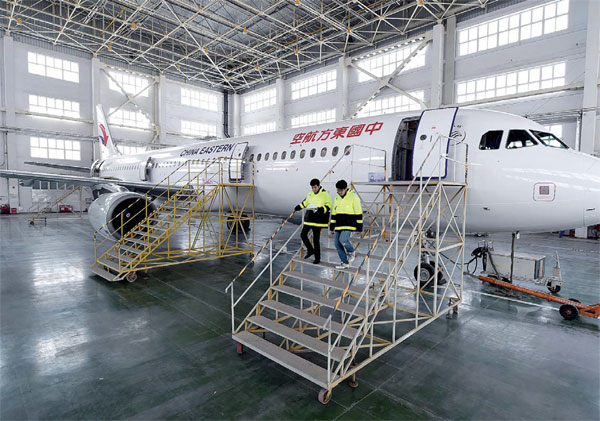At China Eastern, success takes wing
Direct flights from Shanghai to London hub provide travelers with easy access to other destinations
Bill Tao says he still remembers vividly how cramped London Heathrow Airport's Terminal 2 was when China Eastern launched its direct London-to-Shanghai flight in 2004.
"It was an old building. The ceiling was very low, and if you were on the tall side it was very easy to hit your head on the ceiling," says Tao, CEO of China Eastern UK, sitting in his spacious central London office. "And the whole check-in area was very crowded."
Heathrow is now a renovated global hub - with high-ceilinged buildings and advanced check-in facilities. Likewise, China Eastern has grown.
|
Technicians step down from a renovated plane in China Eastern Airlines' factory in Lanzhou, Gansu province. The company is upgrading the interiors of some of its old planes this year to make customers more comfortable. Xinhua |
Its initial twice-weekly flights have increased to daily flights, and Tao now looks forward to even greater frequency.
That comes down to two factors. First is the agreement in October by the UK and China to increase the number of direct flights permitted from each country of origin to 100 - from 40 previously. Restrictions on destinations have also been lifted.
That helps Chinese airlines such as China Eastern, because the previous quota was almost used up, particularly after new flights were added over the summer. Tianjin Airlines launched a new direct flight between Tianjin and London Gatwick via Chongqing, and Hainan Airlines added a new direct flight between Beijing and Manchester.
Second, and perhaps an even bigger factor for expansion, is the UK's approval of a third runway at Heathrow, which is expected to greatly facilitate extra flights.
With more than 80 airlines serving 185 destinations in 84 countries, Heathrow ranked as the world's sixth-busiest airport in 2015, with about 75 million passengers.
Tao says the policy announcements come at an opportune time, given that demand from Chinese travelers is higher than ever.

"We've observed that tourists, students and business travelers have all grown significantly in recent times, and we see great market opportunities," Tao says.
Such optimism appears to be borne out by China Eastern's European expansion this year. The airline added four direct flights in June between Shanghai and St. Petersburg, Madrid, Prague and Amsterdam.
"Those additions are the fastest expansion for us in a long time," Tao says. "China's wealthy middle class is rapidly growing, and tourism in Europe is becoming very popular. To satisfy this great demand, we boosted the importance of international expansion in our strategy."
Founded in 1988, Shanghai-based China Eastern was listed on exchanges in New York, Hong Kong and Shanghai in 1997. Its global network now covers 1,062 cities.
The airline first expanded in the US but soon spread to Europe, adding a Paris flight in 1995 that now runs twice daily. It later added direct flights to Rome, Frankfurt and Moscow in the 90s. Now those routes are flown daily.
Tao says China Eastern's key advantages are its customer service quality, its investments in new aircraft and the location of its home hub in Shanghai.
"We have very good customer service both on the plane and on the ground, because we emphasize that as a company," says Tao. That includes check-in, luggage handling, administrative help and picking a wide range of meals to satisfy their tastes.
Tao says the China Eastern fleet is new, providing greater comfort to passengers. The airline's current 600 planes have an average age of about six or seven years. It aims to increase the number of aircraft to 800 by 2020.
Shanghai's good connectivity helps boost flight demand, Tao says:
"It means that a lot of customers can travel from nearby cities to Shanghai and connect to London. Meanwhile, London's prominence as a global hub also increases the popularity of our Shanghai-London flight, because many of our customers can easily connect to other European cities."
Industry analysts say Chinese airlines have a big advantage in running UK-China direct routes because of their brand recognition with Chinese travelers and the cost advantages they offer.

Dan Elliott, head of aviation practice at London-based consultancy Frontier Economics, says Chinese airlines may also have lower labor costs. And as relative newcomers they also have modern and more fuel-efficient fleets.
Although Chinese and British airlines can provide comparable services to customers, so-called brand default theory suggests that passengers originating in China are more likely to fly on a Chinese airline than a British one.
Because the number of passengers originating in China is likely to grow, since Chinese increasingly want to visit the UK, Chinese airlines enjoy an advantage, Elliott says.
Data from VisitBritain show that in 2015 more than 1 million passengers traveled between the UK and China, an 11 percent increase over 2014.
Paul Argyle, managing director of Flight Directors, an aviation marketing firm, says Chinese airlines' rapid expansion gives them significant economies of scale, which means the ability to buy airplanes and fuel at cheaper prices.
Tao highlights another advantage: a favorable London flight slot. London customers leave in the evening, securing a good night's sleep after a full working day. Shanghai customers leave at midday, meaning there is sufficient time to travel to the airport from nearby cities.
Tao adds that China Eastern's international expansion is not just about adding flights.
"As a part of our international expansion, we've also made our recruitment more global," he says.
China Eastern's human resources department now sends a team to London universities to interview Chinese graduates, selecting the best for a management training program in China.
Those selected participate in a three-year rotation program and training, after which they find a career path shortcut to middle management. Previous recruiting efforts were limited to Chinese universities.
Despite its international perspective, China Eastern's corporate culture in London maintains the warmth and family-like quality typical of a Chinese company.
"Our employees in London are mostly Chinese who have lived in London for a long time," Tao says. "We go out for a big meal to celebrate Chinese New Year together, and on New Year's Day we allow employees to go home early so they can spend more time with their families."
cecily.liu@chinadaily.com.cn
(China Daily European Weekly 11/18/2016 page29)























